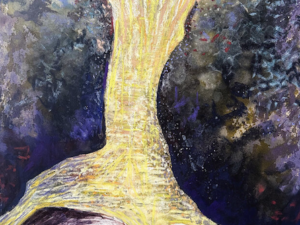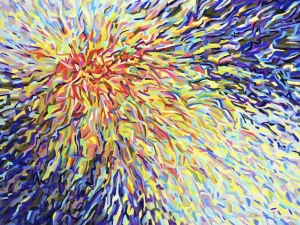I am struggling with concern about the fate and soul of my nation. You may be struggling with pain or disease, relationship strife, or sinful behavior. As I try to find my own peace, I’ve started to contemplate struggle as an activity in itself. Two things leap out to me, and they have everything to do with worldview. Are we working “up to” or “out from”?
I long ago saw the dichotomy between working “up to” perfection and working “out from” it. These are two very different vantage points with very different premises, processes, and results. You can toil up the steep hill toward perfection, self-immolating and self-correcting every difficult step of the way, or alternatively, you can accept that you were already made as God’s perfect creation, and from that standpoint express it in all you do.
Basically the choice is struggling to get something or accepting that spiritually you already have everything you need.
We all have to overcome the world’s opposition to Truth in our own consciousness. That is the only place we can ever deal with it, and no one can solve a problem on the same level as the problem. We have to go higher. Also, we each can only deal with our own consciousness. We have to rely on God to manage the consciousnesses of others. So maybe we should depend on God with our own too?
When spirituality is undeveloped, human will is resorted to, which makes that “up to” climb a very hard one, disconnected as it is from divine help. Mary Baker Eddy says, “Be of good cheer; the warfare with one’s self is grand; it gives one plenty of employment, and the divine Principle worketh with you, — and obedience crowns persistent effort with everlasting victory.” What is this warfare but the relinquishing of human will?
By contrast, consecrated spirituality, cultivated most fully, reverently defers to God’s benevolent government of all. Living “out from” this perspective, the struggle is instead merely one of continuous trust.
We are usually struggling for a sense of progress, so it may be helpful to note that we also tend to have one of two world views regarding where progress comes from. Some people think it comes through prolonged exertion, the more excruciating the more beneficial. “No pain, no gain,” the weight-lifters say, and that is some serious “up to” thinking. Some people justify difficulties and challenges as necessary to progress, but that suffering is imposed by human ignorance rather than divine instruction. Contrariwise, the true “out from” outlook on progress is one of devoted, practical, obedience to God’s law.
Basically, the degree we are experiencing a human sense of struggle or using any “up to” methodology, is an index of how unfulfilled and unreliant our spiritual consciousness is. This is solved by switching to a higher basis, one that realizes the presence and power of God, who thankfully is omnipotent. Omnipotence battles with no opposition, and experiences no struggle for mastery, harmony, or supremacy.
When one truly understands the power of God, one quickly abandons the struggle to control outcomes. There is rejoicing that nothing can interfere with God’s loving and complete control, and also gratitude that it is not on us to figure it out. The struggle changes to a choice of acquiescence to the one and only real God’s genuine will– instead of our own– knowing that God’s will is only ever good. Yielding our will in favor of God’s wisdom allows us to begin to live “out from,” already having what we need, instead of continuing with the exhausting wrestle for what we want.
From God’s perspective of infinite, ever-present good, what you are struggling with is an illusion anyway. Does a dreaming person best solve the problem in the dream, or by waking up? In an “out from” spiritual consciousness, there is no evil with which to contend, because God-likeness –infinite good– fills all space. This can be such a relief to understand. Like mirages, problems can look very real humanly, but actually not be true.
Eddy also says aptly, “The habitual struggle to be always good is unceasing prayer.” This is the right sense of “out from” struggle. So is Paul’s injunction in Timothy,”Fight the good fight of faith, lay hold on eternal life…” And Jesus said, “Come unto me, all ye that labor and are heavy laden [ie: trying to do it in the “up to” method], and I will give you rest [show you a better way].”
When Jesus struggled in Gethsemane, he solved his own struggle by understanding, “Not my will, but Thine be done.” He switched his thinking from his own heartfelt concerns to trusting God’s will, and although it looked pretty bad for a while, his trust was not misplaced. His whole ministry was about getting people to make this same shift from hand-wringing to spiritual dominion.
We too are made by God to be Christ-like, coming pre-programmed as God’s image and likeness, with all the qualities and attributes of God. Each of us can choose to live “out from” that place, expressing and manifesting every bit of that goodness more and more. Then the day will grow brighter and brighter, until true spiritual poise is gained, and struggle is replaced by triumph.
As a friend of mine says, “It’s not over until Love wins.”
2 Comments
-
Even a casual familiarity with the Bible makes us aware of its preoccupation with idolatry . Idolatry is the essential sin. Paul teaches that Christ alone overcomes idolatry. It is not for us to “immitate Jesus ” but to be ” in Christ.”Christ alone can make us a “new creation.” No wonder a rabbi friend told me ” Jesus I don’t mind-it’s Paul I can’t stand.
-
The beauty of this post is that it is impossible to “think up to” Mind, or attainment, that would put one outside of Mind, Good. Thus we always have been, and always will be, thinking “out from” Divine Mind whether we realize it or not. Hence, switching your viewpoint to the absolute may be best understood as an unfoldment of Reality from within, not a switch in thinking.
Reality can now be dealt with without struggle – regardless of appearance, as a sense of struggling, rather than confidence, tends to keep error in play.









